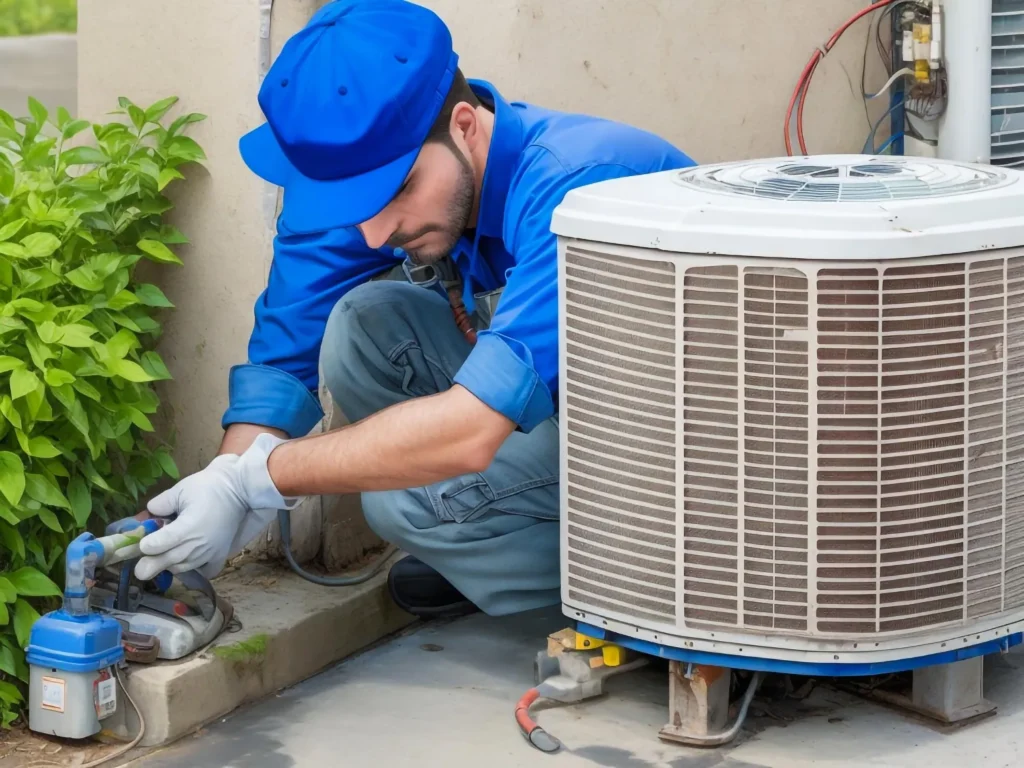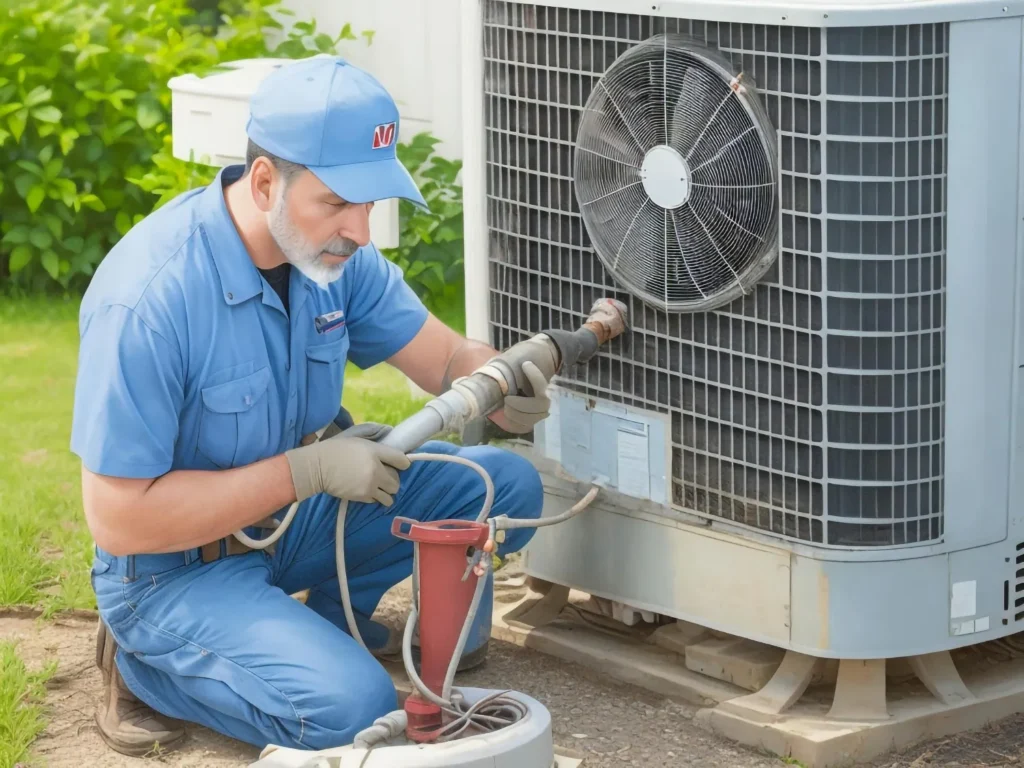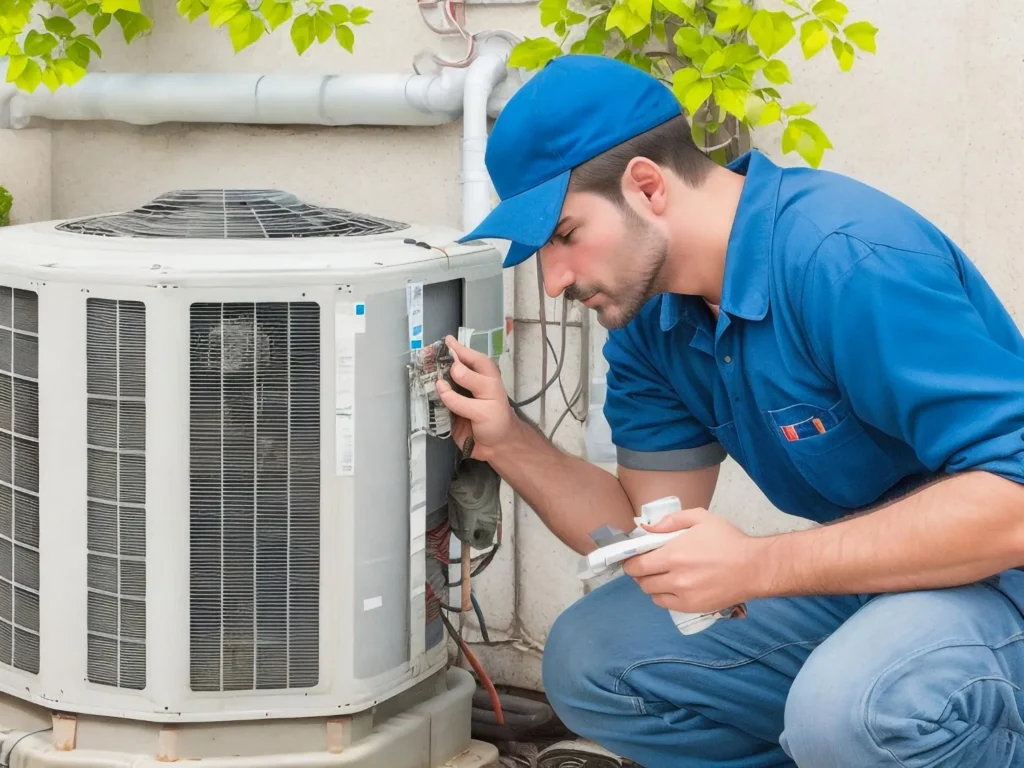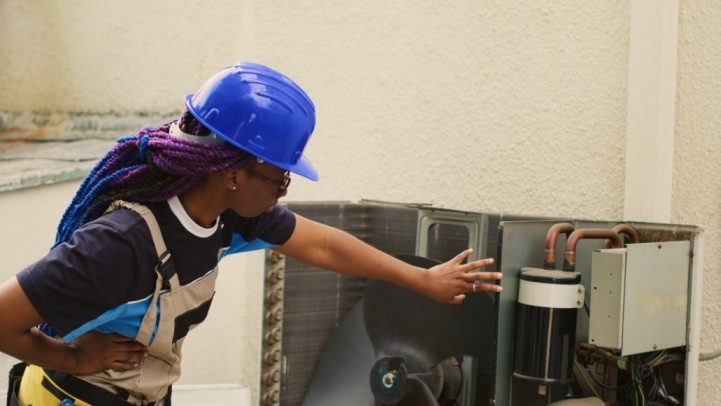Ready to keep your AC running smoothly all year round? It’s time to talk about air conditioner maintenance! Our guide gathers expert advice on scheduling seasonal maintenance to ensure your home stays relaxed and comfortable.
Say goodbye to unexpected breakdowns and hello to reliable, efficient cooling. Let’s dive in and learn how to give your AC the TLC it deserves!
Table of Contents
5 Smart Tips for a More Efficient A/C System

Make Sure The Air Conditioning Filter is Clean
Keeping your air conditioning filter clean is crucial for maintaining your air conditioner. The filter traps dust, dirt, pollen, and other particles in the air, preventing them from spreading throughout your home and causing problems with your system.
However, these particles can build up as time passes, making the filter dirty and blocking airflow. This blockage makes your air conditioner maintenance work harder to keep your home at the right temperature, which can lead to higher energy consumption and potential damage to your system.
To avoid these problems, checking your air filter regularly and cleaning or replacing it as necessary is essential. How often you should do this depends on factors like the type of filter you have, how much you use your system and the quality of your indoor air.
As a general guideline, it’s a good idea to inspect your filter once a month and clean or replace it every 1-3 months, especially when using your air conditioner frequently. Regular filter maintenance helps your air conditioner maintenance run more efficiently. It improves the air quality inside your home by reducing the amount of dust, pollen, and allergens. Plus, keeping your filter clean can reduce strain on your HVAC system’s components and lower the risk of expensive repairs.
Inspect the Outside Condenser
The outdoor condenser unit is a crucial part of your air conditioning system. It’s responsible for releasing the heat absorbed inside your home to the outside environment. However, this process can be disrupted if the condenser becomes blocked by debris like leaves, dirt, and grass clippings.
When airflow is restricted, your system has to work harder to cool your home, which reduces efficiency and increases energy consumption. To ensure your system runs smoothly, regularly checking the exterior of your condenser for debris is essential. Start by turning off the power to the unit to prevent accidents.
Then, remove any obstacles blocking airflow. Then, carefully remove debris around the unit using a soft brush or vacuum cleaner. Pay special attention to the fins and coils, which can quickly become clogged with dirt and debris.
In addition to removing debris, it’s also crucial to maintain adequate clearance around the condenser unit. Ideally, at least two feet of space between the unit and any surrounding structures or vegetation to allow for proper airflow. Keeping the area around your condenser clear and free of obstructions can ensure optimal performance and efficiency for your air conditioning system.
Visually inspect your ductwork.
The ductwork in your home plays a vital role in distributing cooled air from your air conditioner to various rooms and areas. However, leaky or poorly insulated ducts can lead to significant energy loss and reduced efficiency in your HVAC system.
Over time, ducts can develop tears, gaps, or disconnected joints, allowing cooled air to escape into unconditioned spaces such as attics, crawl spaces, or wall cavities. To identify and address these issues, it’s essential to visually inspect your ductwork regularly. Begin by examining the visible portions of your ductwork, paying close attention to any signs of damage, such as visible tears, gaps, or disconnected joints.
Additionally, check for signs of insulation damage or deterioration, as inadequate insulation can also contribute to energy loss and reduced efficiency. Suppose you discover any issues during your inspection. In that case, addressing them promptly is crucial to prevent further energy waste and potential damage to your HVAC system.
Depending on the severity of the problem, you may be able to repair minor leaks or gaps yourself using duct mastic or foil tape. However, it’s best to consult a professional HVAC technician who can assess the situation and recommend the appropriate course of action for more extensive damage or insulation issues.
Properly sealing and insulating your ductwork can minimize energy loss and ensure that cooled air reaches its intended destination, keeping your home comfortable and your energy bills low.
Properly Winterize the Unit

In addition to regular inspections and cleaning, it’s essential to give your outdoor condenser unit a thorough rinse now and then to get rid of any stubborn dirt or grime that builds up over time. While routine tasks like cleaning the fins and coils can help prevent dirt and debris from piling up, some buildup may be more challenging and require more intensive cleaning.
Here’s how you can effectively rinse your condenser unit:
- Start by turning off the power to the unit and unplugging it to avoid accidents.
- Then, grab a garden hose with a gentle spray nozzle.
- Carefully spray the condenser’s exterior, focusing on the fins and coils.
- Make sure to use a soft spray to avoid damaging the delicate parts of the unit.
- Avoid high-pressure water or harsh chemicals, which can do more harm than good.
Aside from rinsing the exterior, clearing any debris or obstructions from around the unit that might block airflow is crucial. Trim back any plants or foliage too close to the unit and ensure at least two feet of space for proper airflow.
Giving your condenser unit a periodic rinse can remove stubborn dirt and grime, ensuring your air conditioning system runs smoothly and efficiently and lasts longer.
Periodically Rinse Your Condenser
In addition to regular inspections and cleaning, it’s also essential to give your outdoor condenser unit a thorough rinse periodically to remove any stubborn dirt or grime buildup that may accumulate over time. While routine maintenance tasks such as cleaning the fins and coils can help prevent the accumulation of dirt and debris, some buildup may be more challenging and require more intensive cleaning methods.
To rinse your condenser unit effectively, turn off the power to the unit and disconnect any external power sources to prevent accidents or injuries. Next, use a garden hose with a gentle spray nozzle to carefully rinse the condenser’s exterior, paying particular attention to the fins and coils.
Be sure to use a gentle spray to avoid damaging the delicate components of the unit, and avoid using high-pressure water or harsh chemicals, as these can cause more harm than good. In addition to rinsing the condenser’s exterior, removing any debris or obstructions around the unit that may block airflow is essential. Trim back any vegetation or foliage encroaching on the unit, and ensure at least two feet of clearance around all sides to allow for proper airflow.
By periodically rinsing your condenser unit, you can remove stubborn dirt and grime buildup, ensuring optimal airflow and efficiency and prolonging the lifespan of your air conditioning system.
Easy HVAC Tips & Tricks
Maintaining your HVAC system doesn’t have to be complicated. Here are some easy tips and tricks to keep your air conditioner maintenance or air conditioner running smoothly:
- Schedule Regular Air Conditioner Maintenance: Like any other mechanical system, your air conditioner requires regular air conditioner maintenance to perform optimally. Consider scheduling annual professional maintenance to inspect and tune up your system before the start of the cooling season.
- Keep Vents Clear: Ensure that all vents and registers in your home are clear of obstructions, such as furniture, curtains, or rugs. Blocked vents can restrict airflow and reduce the efficiency of your HVAC system, leading to uneven cooling and increased energy consumption.
- Use Ceiling Fans: Ceiling fans can help distribute cool air more effectively throughout your home, allowing you to set your thermostat higher without sacrificing comfort. During the summer months, ensure your ceiling fans rotate counterclockwise to create a cooling breeze.
- Invest in a Smart Thermostat: Upgrade to a smart thermostat that allows you to program temperature settings based on your schedule and preferences. Smart thermostats can help optimize energy usage and save money on utility bills by automatically adjusting the temperature when you’re away or asleep.
- Consider Air Sealing and Insulation: Proper air sealing and insulation can significantly improve your home’s energy efficiency and reduce the workload on your HVAC system. Seal any air leaks around windows, doors, and ductwork. Add insulation to attics, basements, and crawl spaces to minimize heat transfer.
Your Air Conditioner Maintenance

Regular maintenance is crucial for keeping your air conditioner running smoothly and reliably. Here are some essential tasks to keep your A/C in great shape:
- Clean or Replace Air Filters: Dirty filters can block airflow, making your A/C work harder and use more energy. Check and clean or replace filters regularly for better efficiency.
- Inspect and Clean Condenser Coils: Outdoor coils can get clogged with dirt and debris, reducing efficiency. Clean them regularly to keep airflow unrestricted.
- Check Refrigerant Levels: Low refrigerant can mean a leak, affecting cooling and possibly damaging your system. Have a pro check and recharge refrigerant as needed.
- Inspect and Lubricate Moving Parts: Moving parts can wear out over time, leading to inefficiency and breakdowns. Regular inspection and lubrication can prevent this.
- Clean and Unblock Condensate Drain: A clogged drain can cause water damage and mold. Regularly check and clear any blockages to keep your system running smoothly.
FAQ More About Air Conditioner Maintenance
How do I keep my AC healthy?
Keeping your air conditioner in good shape means doing regular maintenance tasks like cleaning or changing air filters, inspecting and cleaning condenser coils, checking refrigerant levels, and ensuring good airflow and ventilation in your home. Having a professional check it out once a year is also a good idea to catch any problems before they get worse.
How do I make sure my AC is working correctly?
To make sure your air conditioner stays in good shape:
- Keep an eye on how it’s doing regularly.
- Look out for things like it not cooling as well as it should, weird noises, or odd smells.
- Get a qualified HVAC technician to check it out regularly to catch any problems early and keep it running smoothly.
How do I maintain my air conditioner myself?
While some air conditioner maintenance tasks need a pro, you can do much yourself. Like changing filters, cleaning coils, checking refrigerant levels, and ensuring air moves freely in your home.
What are the safety measures of AC?
There are a few essential steps to keep air conditioners safe and working well. First, make sure a skilled HVAC technician installs them correctly. Then, checking and maintaining them often is crucial to avoid problems. Follow the instructions from the manufacturer for how to use and take care of them. Also, keep the space around outdoor units precise of things like leaves or trash so air can flow freely.
What are safety controls in HVAC?
Safety controls in HVAC systems are like guardians that keep everything safe and working smoothly. They’re gadgets or tools meant to stop any harm or problems. For instance, some switches check the refrigerant levels, sensors that prevent things from getting too hot, and switches that turn off the system if something severe goes wrong.
What is the safety factor for HVAC?
When we talk about the safety factor for HVAC, we’re talking about having extra protection for heating, ventilation, and air conditioning systems. This additional protection helps keep everything running smoothly, even if something unexpected happens. It could mean using more extensive equipment, having more safety controls, or backup plans to prevent accidents or damage to the system.
Get Expert Help For Air Conditioner Maintenance
If you’re and need professional air conditioner maintenance services, look no further than 75 Degree AC. We specialize in providing top-notch HVAC services to keep your home comfortable year-round. Contact us today at (713)-598-2737 or email us at 75degreeacservices@gmail.com. You can also visit us at 4214 Mangum Rd, Houston, TX 77092. Let us help you keep your air conditioner running efficiently and effectively!




